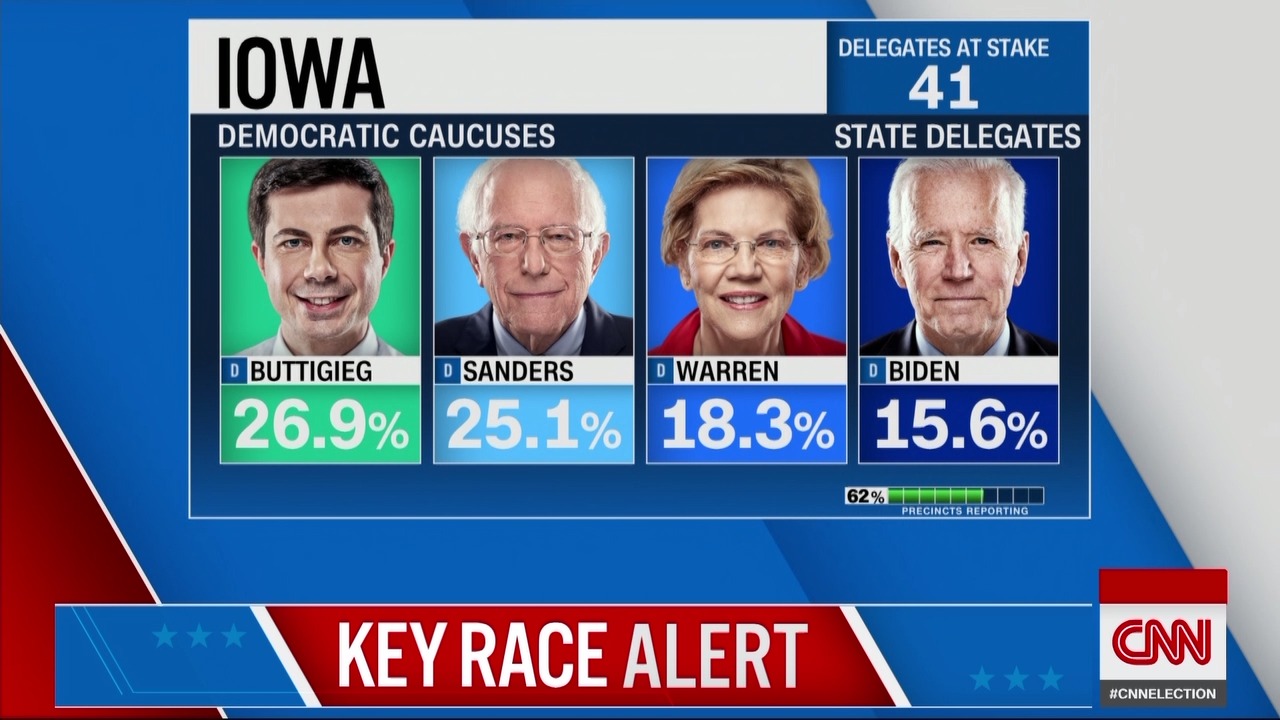Buttigieg leads, Sanders 2nd in initial Iowa caucus results

DES MOINES, Iowa -- Iowa's Democratic Party started releasing partial caucus results late Tuesday afternoon following a day-long delay sparked by technical problems.
With 62% of Iowa precincts reporting, Pete Buttigieg was leading with 26.9%. Bernie Sanders was in second with 25.1%.
The tally of state delegate equivalents released Tuesday showed Elizabeth Warren, Joe Biden and Amy Klobuchar trailing behind.
The party released a majority of results from all 99 counties -- but it was too early to call a winner based on the initial results. It was also unclear when the remaining results will be released by the party, which said it is still verifying data from caucuses across the state.
Buttigieg claimed that his performance in Iowa was “phenomenal,” especially given the fact that he had started his presidential campaign with little name recognition.
Meanwhile, a senior adviser for the Sanders' campaign said the team was "gratified" by the results so far
Buttigieg, the 38-year-old former mayor of South Bend, Indiana, becomes the first openly gay candidate to earn presidential primary delegates. His early strength reflects his aggressive political pursuit of rural and small-town voters, including some Republicans, who prefer a more moderate approach to address the nation's political problems.
“We don’t know all of the numbers, but we know this much: A campaign that started a year ago with four staff members, no name recognition, no money, just a big idea - a campaign that some said should have no business even making this attempt, has taken its place at the front of this race,” Buttigieg declared, his voice filled with emotion, while campaigning in next-up New Hampshire.
The other early leader, Sanders, a self-described democratic socialist, has spent decades fighting to fundamentally change the nation's politics and economy. He has attracted significant support from young voters in particular.
While campaigns were eager to spin the results to their advantage, there was little immediate indication that the incomplete results erased the confusion and concern that loomed over the Iowa contest. It was unclear when the full results would be released.
During a private conference call with campaigns earlier in the day, state party chairman Troy Price declined to answer pointed questions about the specific timeline -- even whether it would be a matter of days or weeks.
“We have been working day and night to make sure these results are accurate," Price said at a subsequent press conference.
The leading candidates pressed on in New Hampshire, which votes in just seven days, as billionaire Democrat Michael Bloomberg sensed opportunity, vowing to double his already massive advertising campaign and expand his sprawling staff focused on a series of delegate-rich states voting next month.
The party's caucus crisis was an embarrassing twist after months of promoting the contest as a chance for Democrats to find some clarity in a jumbled field with no clear front-runner. Instead, after a buildup that featured seven rounds of debates, nearly $1 billion spent nationwide and a year of political jockeying, caucus day ended with no winner, no official results and many fresh questions about whether Iowa can retain its coveted “first” status.
Iowa marked the first contest in a primary season that will span all 50 states and several U.S. territories, ending at the party’s national convention in mid-July.

